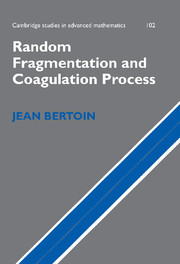4 - Exchangeable coalescents
Published online by Cambridge University Press: 07 December 2009
Summary
Exchangeable coalescents form a natural family of Markov processes with values in the space of partitions of ℕ, in which blocks coagulate as time passes. We shall first present the celebrated coalescent of Kingman, which is often used as a model for the genealogy of large populations. Then we shall introduce a more general family of coalescents, called here exchangeable coalescents, in which coagulations may involve several blocks simultaneously. We shall also investigate the coagulation processes of mass-partitions associated with such exchangeable coalescents. The last section of this chapter is devoted to a representation of these exchangeable coalescents in terms of certain stochastic flows on the unit interval. Many ideas and techniques based on exchangeability, which were useful for investigating fragmentations, can also be fruitfully applied to coagulations.
Kingman's coalescent
Coalescence naturally arises when one studies the genealogy of populations; we first briefly explain why. Following Kingman [139], this will lead us to introduce a natural Markov process with values in the space P∞ of partitions of ℕ.
Genealogy of populations in the Wright-Fisher model
Imagine at time T > 0 a population with size n which can be identified with the set [n] = {1, …, n}. Assume the population is haploid, meaning that each individual has exactly one parent at the previous generation, so we may follow its ancestral lineage backwards in time.
- Type
- Chapter
- Information
- Random Fragmentation and Coagulation Processes , pp. 163 - 213Publisher: Cambridge University PressPrint publication year: 2006

